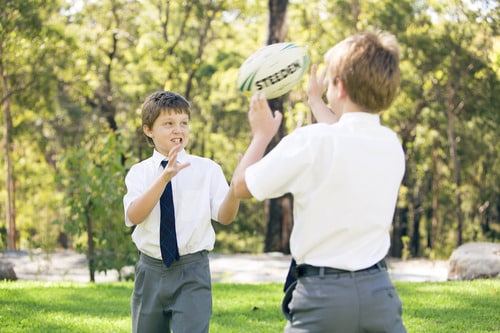
An international study of primary school students showed that just two hours of extra physical activity each week can significantly improve academic performance and concentration levels.

An international study of primary school students showed that just two hours of extra physical activity each week can significantly improve academic performance and concentration levels.
The research project was conducted in Swedish schools but Hunter Medical Research Institute Director Michael Nilsson, one of the chief investigators, believes it has universal implications.
“The results are interesting,” Professor Nilsson said. “A larger proportion of students in the intervention school performed better in all subjects examined – Swedish, English and mathematics – and I believe that this would translate to Australian schools.”
More than 400 12-year-olds in Gothenburg were given two hours of extra play and motion activities per week at a sports club. This was around twice the usual amount of curricular physical activity.
The study, run by the Sahlgrenska Academy at the University of Gothenburg, was evaluated by comparing the attainment of national learning goals by the children four years before and five years after its implementation. The results were compared to control groups in three schools.
“Two hours of extra physical education each week doubled the odds that a pupil achieved the national learning goals. In the control schools, where the pupils did not receive extra physical activity, we actually saw a decline,” Professor Nilsson said.
“We’ve previously found a strong correlation between cardiovascular fitness, IQ and brain resilience in young adults. Interestingly, we now demonstrate a link in young children, adding to this exciting line of research.”
Swedish children are generally as active as others from developed nations, often playing indoor sports during the long winters, and the study result challenges the stereotype that intelligent children sit at a computer or read all day.
“I’m convinced that smart children who are also physically active can boost their performance even more because they are more broadly and holistically competent in a social sense,” Professor Nilsson adds.
“It’s very important to have multimodal and multisensory stimulation to develop different parts of your intelligence.”
Study leader Lina Bunketorp Käll wants education policy-makers to take note of the results: “Authorities have been discussing whether physical education takes time away from academic subjects and weakens school performance, but our study shows that exactly the opposite may be the case,” she said.
The research team is further investigating gender differences, psychological health and biological mechanisms.
“We believe that Brain Derived Neurotrophic Factor (a secreted protein) is a strong mediator, and growth hormone (GH) is another, but the biochemistry surrounding cardiovascular fitness is very complex,” Professor Nilsson concludes. “There are multiple pathways that are activated after physical exercise.”
HMRI is a partnership between the University of Newcastle, Hunter New England Health and the community.